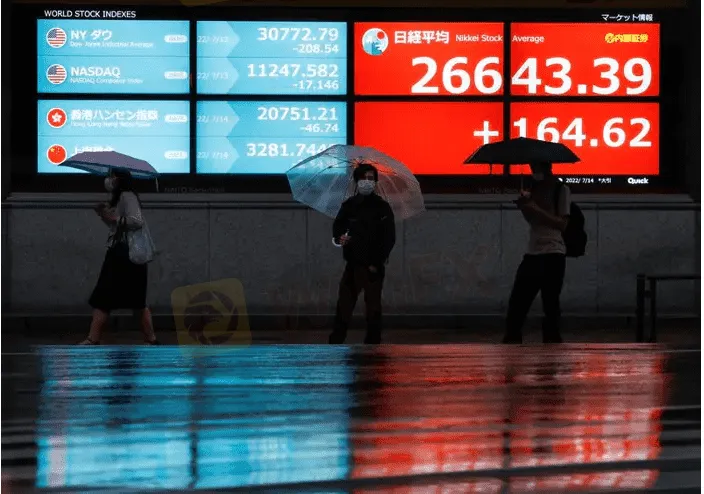简体中文
繁體中文
English
Pусский
日本語
ภาษาไทย
Tiếng Việt
Bahasa Indonesia
Español
हिन्दी
Filippiiniläinen
Français
Deutsch
Português
Türkçe
한국어
العربية
Shares rally as markets bet on more gradual rate hikes
Abstract:Asian stocks took their cue on Friday from a late rally on Wall Street, as markets focused on a possible slowdown in the pace of rate hikes rather than a U.S. recession after data showed its economy shrinking for a second straight quarter.

MSCI‘s broadest index of Asia-Pacific shares outside Japan rose 0.41%. Japan’s Nikkei share average opened up 0.36%, while the Seoul index and Australias index opened up 0.75% and 0.76% respectively.
Economists are debating whether the worlds biggest economy is already in or on the verge of a recession, as it battles its highest inflation in four decades and gross domestic product shrinks – at a 0.9% annualized rate last quarter, after a 1.6% contraction in the quarter before that.
The Federal Reserve delivered another aggressive interest rate hike of 75 basis points this week, its third this year.
Meanwhile, China, still in the throes of COVID-19 outbreaks and lockdowns, did not mention its full-year GDP growth target after a high-level Communist Party meeting and said instead it will try hard to achieve the best possible results for the economy this year.
U.S. equities, however, rallied this week as comments by Federal Reserve Chair Jerome Powell led to speculation that rate hikes would begin to slow and eventually turn to rate cuts in 2023. Shares of Amazon and Apple shot up 12% and 3% each after hours after the tech giants reported earnings that beat expectations.
The Dow Jones Industrial Average rose 332.04 points, or 1.03%, to 32,529.63, the S&P 500 gained 48.82 points, or 1.21%, to 4,072.43 and the Nasdaq Composite added 130.17 points, or 1.08%, to 12,162.59.
But analysts warned the rally could be short-lived.
“Financial markets have taken the combination of the … (Fed) announcement and … the negative U.S. GDP print as confirmation that policymakers will ease off their aggressive monetary tightening cycle before too long. Our sense, however, is that such hopes are premature and that some of this years dominant trends, notably the rise of the U.S. dollar, will reassert themselves before too long,” Capital Economics said in a note.
The dollar stayed near a six-week low against the yen for similar reasons, trading at 134.39 yen, bouncing 0.13% after an overnight plunge of 1.74%, the most since March 2020. It touched a low of 134.2 on Thursday, the weakest since June 17.
U.S. Treasuries slipped on the weak economic data, with the yield on benchmark 10-year Treasury notes retreating to 2.6759%. The two-year notes yield, which typically moves in step with interest-rate expectations, was at 2.8703%.
“Theres this see-saw at the moment with inflation and growth concerns,” said Tom Nash, fixed income portfolio manager at UBS Asset Management in Sydney, with surprisingly soft U.S. growth figures putting the focus on the latter.
“When it‘s inflation concerns, yields are going up, when it’s growth concerns yields are going down. What were seeing at the moment is the market is putting less emphasis on inflation and more on growth.”
Brent crude futures rose 0.8% to $108 a barrel and U.S. West Texas Intermediate crude (WTI) was up 1.08% at $97.46.

Disclaimer:
The views in this article only represent the author's personal views, and do not constitute investment advice on this platform. This platform does not guarantee the accuracy, completeness and timeliness of the information in the article, and will not be liable for any loss caused by the use of or reliance on the information in the article.
Read more

Forex Hedging: Is It a Trader’s Safety Net or Just an Illusion?
In the volatile world of forex trading, risk is inevitable. One widely used strategy is forex hedging, which is a useful technique designed not to eliminate risk entirely, but to reduce its potential impact. As global economic uncertainty persists, understanding how hedging works could be an essential addition to a trader’s toolkit.

Thinking of Investing? Read Must-Know Facts About Funding pips!
When you check the internet for Funding Pips, you'd be surprised to know it's filled with praise for Funding Pips but often lacks the real facts that traders need. Everything that seems too good to be true should always be verified first. It could be Fraud . So, we conducted research and collected several facts you must know about Funding Pips.

OctaFX Back in News: ED Attaches Assets Worth INR 134 Cr in Forex Scam Case
The Enforcement Directorate (ED) in Mumbai has attached assets worth around INR 131.45 crore. This included a luxury yacht and residential properties in Spain. Read this interesting story.

Oil Prices Stay Firm on Solid US Jobs Data
Oil prices stayed firm this week as the US labour department posted a better-than-expected payroll data in June 2025. Read this news in detail.
WikiFX Broker
Latest News
CFD Brokers Face Dual Compliance Pressures Ahead of 2026: Australia and EU Tighten Rules
Services Surveys Signal 'Expansion' In June, Inflation Fears Remain High
Major Risks Associated with AuxiliumFX: You Need to Know
ASIC cancels AFS licences of Ipraxis and Downunder Insurance Services
CFI Financial Group Becomes Official Online Trading Partner of Etihad Arena
FxPro to Launch Crypto Trading Desk, Deepening Digital Asset Push
Global Brokers Vs. Indian Rules: Why They Struggle in India
Discover 5 Benefits of Trading with Trive FX Broker
Indian regulator bars U.S. firm Jane Street from accessing securities market, impounds $566 million in manipulation probe
Asia-Pacific markets trade mixed ahead of Trump's deadline for higher tariffs
Currency Calculator


